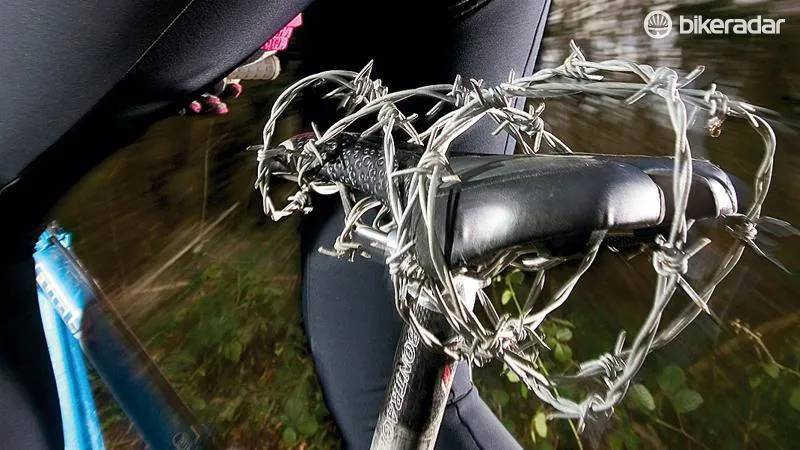Following today’s revelation that British people are ‘having less sex’, we felt it was timely to revisit the results of two studies from a few years back.
Published by the American Urological Association, it investigates the link between cycling and both sexual health and urinary function... and you'll be relieved to hear that the news is good! Mostly...
- 3 weird road bike saddles (and why we love them)
- 5 simple steps to cycling saddle comfort
- Best women's bike saddles: a buyer's guide
It's a question that might be on the mind of many regular cyclists — does all that pressure on your delicate nether regions have an effect on your sexual health? Or what about the bacterial breeding ground that is the chamois; a recipe for urinary tract infection (UTI) hell?
The American Urological Association, a medical research organisation with a focus on genitourinary health, presented the results of two seperate studies on the impact of cycling on men's sexual and urinary functions, and on the impact of cycling on women's sexual and urinary functions at a conference in Boston, MA, USA.
- REF: The impact of cycling on women's sexual and urinary functions
- REF: The impact of cycing on men's sexual and urinary functions
Cyclists compared to runners and swimmers
While the positive effects of cycling are well known, which include improved cardiovascular health, strength, stress reduction and an improvement in mental wellbeing, there have also long been discussions on the link between cycling and various sexual and urinary tract health issues such as erectile dysfunction, perineal numbness, UTIs and saddle sores.
- Noseless saddles could reduce erectile dysfunction?
- Bike seats and sex: Men are aware, but should women be wary too?
This study aimed to take a detailed comparative look at the impacts of cycling on genitourinary health of male and female cyclists compared to non- or irregular cyclists.
4,000 men took part in the study, of whom 63 percent were cyclists and 37 percent were swimmers or runners who did not cycle. 2,691 women took part, of whom 39 percent were cyclists and 61 percent runners or swimmers who did not regularly cycle.
The study focussed on 'athletes', though the definition of 'athlete' is not mentioned. Since participants were recruited via Facebook adverts and outreach to cycling clubs, with the swimmers and runners recruited as controls, it's likely though unconfirmed that the term 'athlete' is a self-selected title.
Participants were asked about their cycling habits, sexual function, urinary symptoms and histories of UTIs and perineal numbness.
For the purposes of the study, 'high-intensity cycling' was defined as 'cycling for longer than two years, more than three times per week and a daily average of more than 25 miles.'
Cycling could be good for your sex life
Breathe a sigh of relief, regular cyclists, for the results seem positive!
For men, there was no indication that cyclists had worse erectile function than non-cyclists, no impact on the incidence of lower urinary tract infections, and the study found that the cardiovascular benefits outweighed any 'theoretical deterrent of cycling', which essentially means that the benefits far outweigh any negatives. That said, male cyclists did have a greater chance of experiencing perineal numbness.
For women, there seemed to be no 'appreciable' effect on sexual or urinary functions, and no 'significant' urinary symptom differences between cyclists and non-cyclists, though as we haven't seen the paper in full, we can't comment on how the researchers are defining 'significant', and it may relate to frequency, severity, or a combination of several measures.
On the downside, there may be an increased risk of UTIs, and high-intensity cyclists as defined above were more likely to develop numbness and saddle sores, which is hardly revolutionary news.
But possibly the two most interesting elements are the fact that the research summary we've seen indicates firstly that 'bike seat type', by which we assume the researchers mean saddle, had 'no significant effect on results', and secondly that both males and females had higher scores on their respective sexual function tests.

The former is interesting, but without more detailed information on what the researchers mean by 'seat type' and 'significant' we can't comment. We'd still suggest that finding a saddle that is comfortable for you, whatever type that might be, is worth the time and money, as anyone who's tried to ride an uncomfortable saddle with attest.
The second point — higher scores in sexual function tests — is true of both men and women. These tests measure things like arousal, satisfaction (you can work out what that might refer to) etc., and is self-scored. It's not a comment on experience, knowledge or attitudes.
So it seems, according to this preliminary data, that cyclists have a better sex life than non-cyclists, at least marginally.
This, of course, doesn't delve into specifically why this might be and it's unlikely to be the magic effect of sitting on a saddle. However, given that factors such as physical health and mental wellbeing all have an effect on sexual function, if cyclists are fitter and happier, that may well lead to a happier sex life. It doesn't explain why cyclists seem to be happier than the runners or swimmers, though.
Further research needed?
